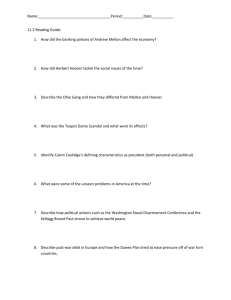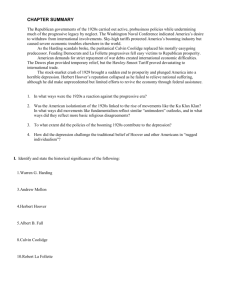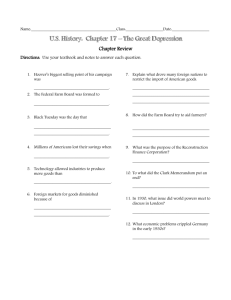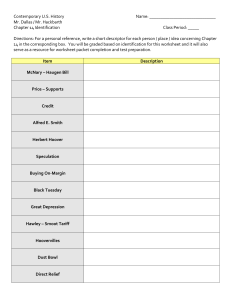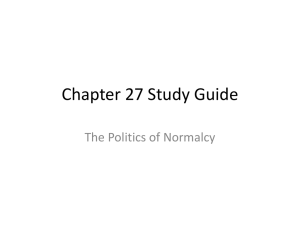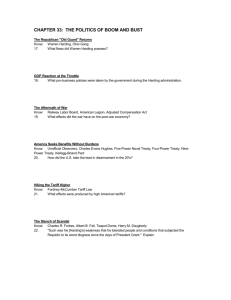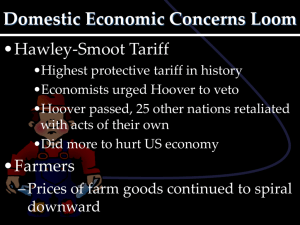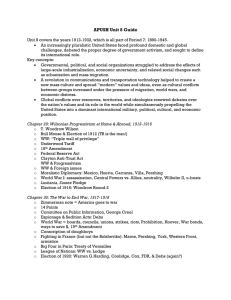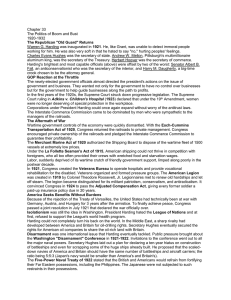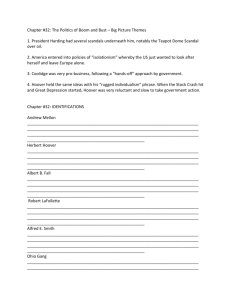File - Noble: AP US History
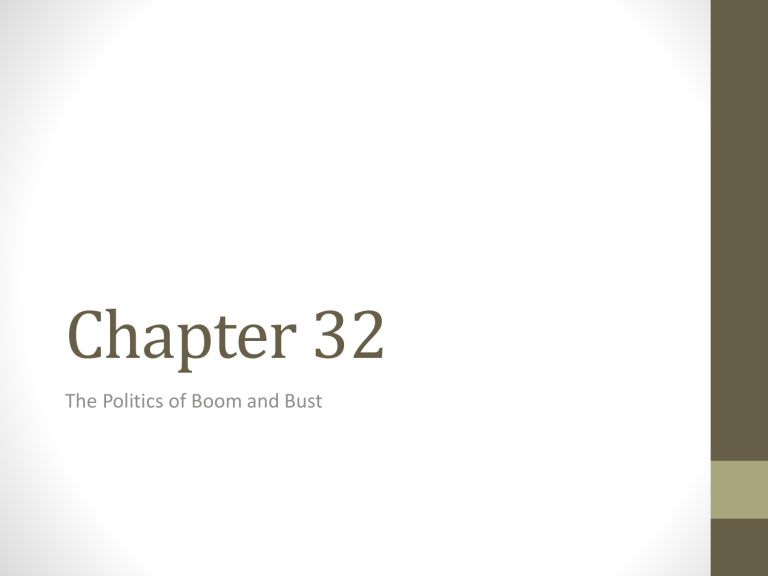
Chapter 32
The Politics of Boom and Bust
Election of 1920
• Warren Harding
• “soft”
• Didn’t like to say no
• Staff tied to corruption
Industrial Gains
• Industrialists wanted government to stop restricting business
• Progressive legislation struck down
• Antitrust laws ignored
• ICC run by men who favored management/business
Pro-Business Legislation
• 1920: railroads returned to private ownership
• Lots of wage cuts
Veterans
• 1921: Veterans Bureau- operated hospitals and rehab for sick/injured
• 1919: American Legion- support/social group for veterans
• 1924: Adjusted Compensation Act
July 21st
• Congress “officially” makes peace from WWI
Foreign Policy
• Isolationism
• Except: America signed treaty with Britain to share oil reserves in Middle East
Foreign Policy
• Washington “Disarmament” Conference
• The Five Power Naval Treaty
• The Four Power Treaty
Kellogg-Briand Pact, 1928
• Ratified by 62 nations
• Outlawed war
• EXCEPT defensive wars
Tariff
• Businessmen didn’t want European products sold in America
• Fordney-McCumber Tariff Law: raised from 27 to
35 %
• Problem: Europe in debt, needs to sell goods or else they can’t pay back debt to US
Scandal- Harding
• Veterans Scandal: $200 million federal funds stolen
• Teapot Dome: Albert Fall accepts a bribe to allow oil companies to drill on federal land
Harding
• Dies in 1923
• Succeeded by “Silent” Calvin Coolidge
Coolidge
• Shy
• Boring speeches
• Continued policies
Farmers
• Machinery
• Crop surpluses
• Trade with other countries
• Government doesn’t help
Election of 1924
• Democrat party: John W. Davis
• Republican: Calvin Coolidge
• Progressive: Robert LaFollette
Progressive Party
• Endorsed by Unions and farmers
• Government ownership of railroads
• Relief for farmers
• Opposed monopolies
Calvin Coolidge wins
Foreign Policy
• Isolationism
• Except: Latin American and Caribbean
• Loaned money to many struggling countries
• Allies couldn't pay back war debt
Dawes Plan 1924
• America would loan money to Germany
• Germany would pay back war reparations
• Allies would pay back America
• Downturn in economy: US never got money
Election of 1928
• Herbert Hoover (r):
• Isolationism
• Individualism
• Free enterprise
• Small government
Herbert’s First Moves
• Tried to help farmers (unsuccessful)
• Hawley-Smoot Tariff 1930: raised tariff to 60%
• Deepens economic depression
• Increased financial chaos in the world
5 Causes of the Great
Depression
• 1. Farmer overproduction of crops and o veruse of land
• 2. Uneven distribution of income
• 3. Unbalanced foreign trade
• 4. Overextended personal debts
• 5. Mechanized industrialization
4 indicators of depression
• 1. Housing starts were declining
• 2. Business Inventories were up
• 3. stock market was overvalued
• 4. people were buying on credit
• http://www.history.com/topics/greatdepression/videos/1929-stock-market-crash
October 29, 1929
• “Black Tuesday”
• By end of year, stockholders have lost $40 billion
• Businesses/banks shut down
• Leads to the Great Depression
Dustbowl
• Agricultural crisis, 1930s
Hoover’s Response
• Industry and self-dependence
• Welfare of people not the government’s responsibility
• Image of presidency
People’s Response to Hoover
• “Hoovervilles”
• Hoover flags
• Hoover leather
• Hoover wagons
• Hoover blankets
Hoover
• Plan:
• Government would help: rrds, banks, creditors
• Trickle down economics
• $2.25 million dollars for public works
• Vetoed “socialist” policies: Muscle Shoals Bill
Reconstruction Finance
Corporation
• Lent money to banks, insurance companies, agricultural organizations, railroads, and state and local governments
“Bonus Army”
• WWI veterans organize Bonus Expeditionary
Force (BEF)
• March on DC, demand bonuses
• Hoover sent in federal troops
• Increased public disdain
Foreign Policy
• 1931: Japan invades Manchuria (China)
• League of Nations unsuccessful
• Stimson Doctrine: US would not recognize any territory acquired by force
• Ignored by Japan
Latin America
• Hoover tries to improve relationships
• Pulls troops out of Haiti and Nicaragua
• “Good Neighbor” Policy
